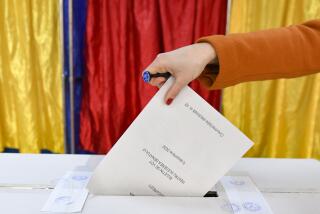Impatient Russians Yearn for Strong Leader, Poll Finds
- Share via
WASHINGTON — Buffeted by economic and political turmoil, the Russian people are growing impatient with democracy and yearning increasingly for a strong leader to solve their problems, a poll conducted by the Times Mirror Center for the People and the Press has found.
“There are real indications that support for democracy is eroding in Russia, especially among the best and the brightest,” said Andrew Kohut, who directed the survey of 1,000 people in eight areas of European Russia. “It would be much easier (for Russians) to embrace a return to a closed society” than it was two years ago, he added.
The poll found that, asked to choose between a strong leader or a democratic government, 51% of Russians favor a strong leader and 31% favor democracy. That was a major shift from a similar poll 17 months ago, when 51% said they favor a democratic government and 39% want a strong leader.
The poll also found increased hostility toward free-market economic reforms and increased uncertainty about whether democracy and capitalism are the correct way to organize a society.
The findings of the poll, one of the most comprehensive surveys ever undertaken in the former Soviet Union, are likely to reinforce a growing sense of alarm in the American government over the possibility that an unfriendly authoritarian regime could emerge in Moscow if the current reforms fail.
Kohut said the overall conclusion of the poll is that democracy is increasingly vulnerable in Russia because people have seen little concrete evidence that it works. “This is certainly not a prediction that democracy is going to die in Russia,” he said. “But it’s a statement of fact that there’s a different political climate now than there was a few years ago,” in the first wave of enthusiasm for democratic reforms.
William Green Miller, president of the American Committee for U.S.-Russian Relations, a private organization, agreed, observing: “The situation is very volatile. This is a country in creation. . . . But democracy can still work there.”
Miller noted that the Russians’ desire for a “strong leader” does not necessarily mean they have abandoned democracy. “Who says a democratic leader can’t be strong?” he asked.
Indeed, the pollsters noted, only 12% of Russians flatly said they disapprove of democracy, and only 10% said that they want a return to communism.
And some features of a capitalist economy have become less unpopular: In 1991, 57% said that private entrepreneurs were a bad influence on society but last year that number dropped to 33%.
Still, the percentage who want democratic reforms to go faster has dropped since 1991 from 40% to 31%, and the percentage who favor Western-style capitalism has dropped from 40% to 32%.
Russian President Boris N. Yeltsin’s approval rating has fallen to 54%, compared with 85% in 1991. At the same time, approval for his more authoritarian and nationalist rival, Vice President Alexander V. Rutskoi, stands at the same level as Yeltsin’s: 54%.
The poll was also conducted in Ukraine and Lithuania, where disenchantment with democracy was less acute than in Russia. In Ukraine, 50% said they preferred democracy to a strong leader; in Lithuania, 67% preferred democracy.
The poll also detected widespread ethnic antagonism. In Russia, 22% of respondents said they have “unfavorable opinions” of Jews. Russians were even more unfavorable to ethnic groups of the southern republics of the Caucasus, whom many Muscovites view as unscrupulous swindlers; they gave Armenians, Azerbaijanis and Georgians “unfavorable” ratings from 46% to 50%.
The survey was conducted Nov. 1-15 by local pollsters under the direction of the Times Mirror Center, a project of the Times Mirror Co., which owns The Times. The statistical margin of sampling error was plus or minus 3%.
More to Read
Sign up for Essential California
The most important California stories and recommendations in your inbox every morning.
You may occasionally receive promotional content from the Los Angeles Times.














